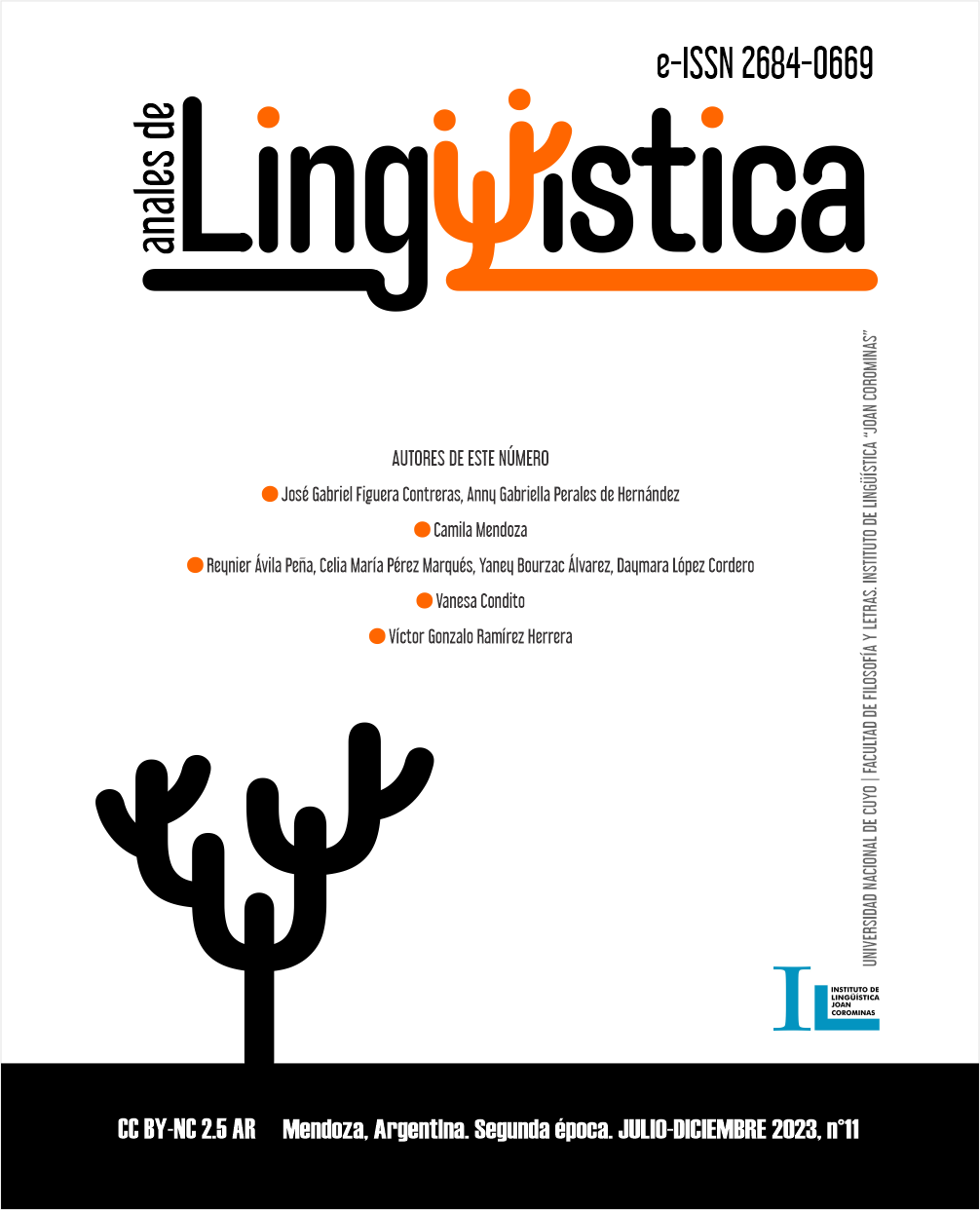The Formation of Concepts Through Proverbs Used in the Spanish of Venezuela
Keywords:
language development, lexical-semantic, concept formation, proverbsAbstract
The research proposed to analyze the development of language from the lexicalsemantic level, specifically in the formation of concepts. This was done by means of the proverbs used in Venezuelan Spanish by children and adolescents between 11 and 17 years of age, all inhabitants of Caracas and Miranda. The theoretical scaffolding was based on Piaget (1976,1973), Vygotsky (1962) and Clemente (2000). Field work was carried out with an explanatory and interpretative character. The information was collected through a videotaped interview and a
written instrument. With the evidence collected, a classification was created with eight types of responses: synonymic, empirical descriptive, imprecise descriptive, analytical descriptive, exemplifying, literal, isolated and exact. The analysis of the results obtained showed that these informants do not have fully developed some competences linked to the lexical-semantic development proper to their age, for example, those related to the comprehension of the metaphorical language contained in proverbs.
References
Acosta, V., Moreno, A., Ramos, V., Quintana, A., y Espino, O. (1996). La evaluación del lenguaje. Teoría y práctica del proceso de evaluación de la conducta lingüística infantil. Aljibe.
Adrián S., T. y Jáimez E., R. (2014). La comprensión de refranes por estudiantes venezolanos de educación media. Letras, 56 (91), 69-92. URL: https://www.revistas-historico.upel.edu.ve/index.php/letras/article/view/8898
Báez S., Mendoza L., Reyes P., Matallana D., Montañés P. (2009). Interpretación de refranes y enfermedad de Alzheimer. Rev. Neurol 49 (11), 566-572. URL: https://doi.org/10.33588/rn.4911.2009139
Bourne, L., Ekstrand, B. y Dominowski R. (1975). Psicología del pensamiento. Trillas.
Bruner, J. S. (1984). Acción, pensamiento y lenguaje. Alianza Editorial.
Cassany, D., Luna M. y Sanz G. (2003). Enseñar lengua. Serie Didáctica de la lengua y de la literatura. Graó.
Chomsky, N. (1974). Estructuras sintácticas. Siglo XXI. (C. Peregrín Otero, trad.).
Clark, H. y Clark, E. (1977). Psychology and Language: An Introduction to Psycholinguistics. Harcourt Brace Jovanovich.
Clemente, R. A (2000). Desarrollo del lenguaje. Octaedro.
Corpas Pastor, G. (1996). Manual de fraseología española. Gredos.
Halliday, M. A. K. (1982). El lenguaje como semiótica social. La interpretación social del lenguaje y del significado. Fondo de Cultura Económica.
Louzan, M., Serrato de Piacenza, D., Balmelli de Barbieri, S., Chelle, E. y Casas, G. (1981). Definición y Conceptualización. Revista Latinoamericana de Lectura, (3), 22-26.
Munteanu, D. (2007). El papel de los refranes en la comprensión y producción del texto. Revista de Filología, 25, 467-475. URL: https://dialnet.unirioja.es/descarga/articulo/2528443.pdf
Oléron, P. (1999). El niño y la adquisición del lenguaje. 3era Edición. Morata.
Oliviusson, S. (2010). La comprensión de refranes en estudiantes de español como lengua extranjera. A buen entendedor, pocas palabras bastan. Institutionen för spanska. URL: http://www.diva-portal.org/smash/get/diva2:382859/FULLTEXT01.pdf
Páez Urdaneta, I. (1995). Comunicación, lenguaje humano y organización del código lingüístico. Vadell Hermanos.
Piaget, J. (1976). El lenguaje y el pensamiento en el niño. Editorial Guadalupe.
Piaget, J. (1973). Psicología del niño. Morata.
Pottier, B. (1993). Semántica General.Gredos.
Prado Aragonés, J. (2004). El ejemplo lexicográfico como referente cultural en la enseñanza del español como lengua extrajera. En Prado Aragonés y Galloso Camacho: Diccionario léxico y cultura. Universidad de Huelva, (pp. 157-171).
Real Academia Española, Asociación de Academias de la Lengua Española. Diccionario de la lengua española, 23.ª ed., [versión 23.6 en línea]. <https://dle.rae.es> [Fecha de la consulta: 15 de febrero de 2023].
Schnitzler Sommerfeld, N. (2015). Comprensión de metáforas en niños con trastorno específico del lenguaje (TEL). URL: https://repositorio.uchile.cl/handle/2250/137887
Skinner, B. F. (1981). Conducta verbal. Trillas.
Ullmann, S. (1978). Semántica. Introducción a la ciencia del significado. Aguilar.
Vygotsky, L. S. (1962). Pensamiento y Lenguaje. La Pleyade.
Winner, E., Rosenstiel, A. N. y Gardner, H. (1976). The development of metaphoric understanding. Developmental Psychology, 12(4), 289-297. DOI: https://doi.org/10.1037/0012-1649.12.4.289
Downloads
Published
How to Cite
Issue
Section
License
Copyright (c) 2023 José Gabriel Figuera Contreras, Anny Gabriella Perales de Hernández
Esta obra está bajo una Licencia Creative Commons Atribución 2.5 Argentina.
Los/as autores/as que publican en esta revista están de acuerdo con los siguientes términos:
1. Los/as autores conservan los derechos de autor y garantizan a la revista el derecho de ser la primera publicación del trabajo bajo una licecncia Creative Commons Atribución 2.5 Argentina (CC BY 2.5 AR) . Por esto pueden compartir el trabajo con la referencia explícita de la publicación original en esta revista.
2. Anales de lingüística permite y anima a los autores a difundir la publicación realizada electrónicamente, a través de su enlace y/o de la versión postprint del archivo descargado de forma independiente.
3. Usted es libre de:
Compartir — copiar y redistribuir el material en cualquier medio o formato
Adaptar — remezclar, transformar y construir a partir del material para cualquier propósito, incluso comercialmente.






